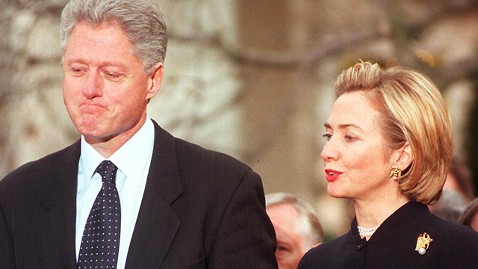Bill Clinton Struggled to Deal With Lewinsky Affair, Film Says

(George Bridges/AFP/getty Images)
Bill Clinton apparently struggled with whether to talk publicly about his affair with White House intern Monica Lewinsky, as his aides were surprised, even dismayed, about his relationship with the 23-year-old.
A new documentary focusing on Clinton's life and presidency reveals that he contacted pollster Dick Morris to gauge whether he should come out with the truth when news of the affair broke.
"He said, 'Ever since I got here to the White House I've had to shut my body down sexually I mean, but I screwed up with this girl. I didn't do what they said I did, but I may have done so much that I can't prove my innocence,'" Morris recalls in the film "Clinton," which was written and directed by Barak Goodman.
"And I said to him, 'The problem that presidents have is not the sin, it's the cover up and you should explore just telling the American people the truth.' He said, 'Really, do you think I could do that?' And I said, 'Let me test it, let me run a poll.' So I took a poll and I tested popular attitudes on that and I called him back and I said, 'They will forgive the adultery, but they won't easily forgive that you lied,'" Morris says in the documentary to air on PBS next week.
Meanwhile, several of Clinton's aides were convinced he was set up.
"He's got all these enemies who are out to get him," Clinton's labor secretary, Robert Reich, said in the film. "He wouldn't be so stupid as to jeopardize his entire presidency. For what? No, that was not the Bill Clinton I knew."
Clinton first denied the affair that broke out in the news media in 1998, famously saying he "did not have sexual relations with that woman." He later admitted to oral sex with the young intern and said his relationship with Lewinsky was wrong and inappropriate.
"I am profoundly sorry for all I have done wrong in words and in deeds," he said Dec. 11 1998. "I never should have misled the country, the Congress, my friends or my family. Quite simply, I gave in to my shame."
Although his subsequent impeachment made him only the second U.S. president to be impeached, Clinton's aides say that in a way, the former president himself set up barriers that he could then leap across and he was always confident he could find his way back.
"How many second chances does any one person deserve?" his former press secretary, Dee Dee Myers, said in the film. "Clinton's view is as many second chances as a person is willing to try to take. As many times as you fail, don't you deserve the chance to redeem yourself? Isn't history loaded with people who have fallen and gotten up, fallen and gotten up and done great things?"
Clinton declined to comment on the film.
The documentary also details the challenges Hillary Clinton faced as first lady. Clinton was, behind the scenes, a powerful force in the White House but aides said her strengths often turned into his weaknesses.
"Voters thought that it was a zero-sum game, that for Hillary to be strong, Bill would have to be weak, and as a result the perception of Hillary's strength became a perception of Bill's weakness," Morris said.
Hillary Clinton was blamed by many for a weak turnout in the 1994 election and for the failure of the administration's health care reform plan in 1993 that failed to gain momentum.
"She was outspoken, she was smart, she was hard driving, and some people resented her," Clinton's Deputy Chief of Staff Harold Ickes said in the film. "Remember during the campaign, it was two for the price of one, well people aren't electing two for the price of one. They're electing the president."
The documentary airs on PBS Feb. 20-21, as part of its "American Experience" series.